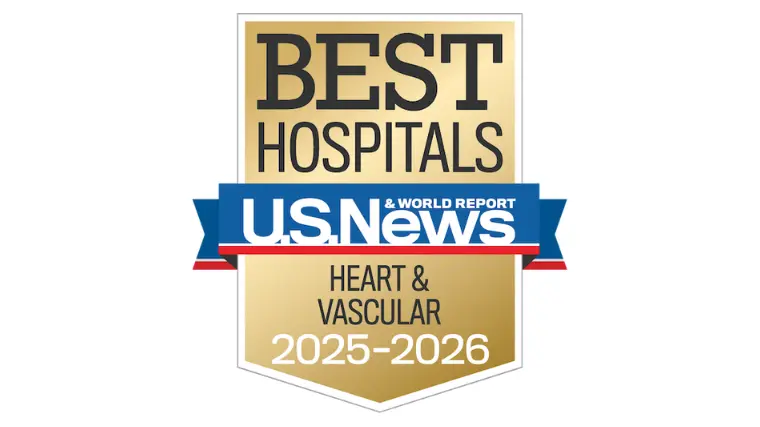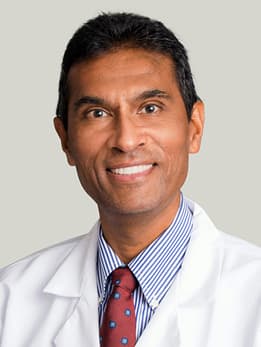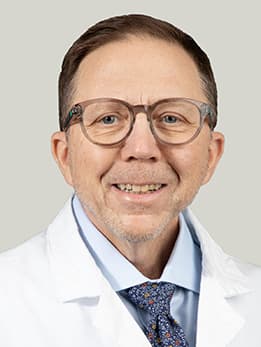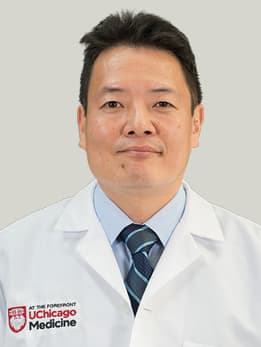Heart Transplant
[MUSIC PLAYING] So UChicago Medicine has a very rich and long history of transplantation. Heart transplant has taken on that tradition, and now it's become one of the leading programs in the country under the banner of UChicago Medicine. It is very rare for a program to have the highest survival rates in the country, which we have had over the last two years. And at the same time, have the shortest wait time for organs.
And historically, no one has ever been the best at both. And UChicago's program over the last three years has been the best, both in wait times, the shortest wait times, and in survival.
The way we achieve such short wait times at the University of Chicago is multifactorial. The first thing, from a recipient standpoint, we bring people in the hospital at the time where they're most likely to get transplanted, when they're most ill and ready for transplant.
The second thing is, in terms of our donor selection, we have a very aggressive approach to selecting and taking donors that other centers may decline. We're willing to travel very large distances and use some fairly advanced technology to allow us to extend preservation time and accept organs from all over the United States.
Sensitization in heart transplantation is when a patient has an immune response that has created antibodies in their body, antibodies that can reject a potential organ, and can get to the point where a highly sensitized patient is no longer able to receive any organ.
And what we do at UChicago Medicine is we take those individuals and evaluate them and do what we can to try and find organs for them, to give them a chance at being an organ transplant recipient. Sometimes it's a matter of medications that we can give to challenge the immune system, to suppress the immune system and reduce those antibodies that that individual has.
It is often also a combination of using diagnostic testing, special tests that we have learned to use to try and quantify which antibodies are the ones that we really need to stay away from. And oftentimes, it's a combination of these strategies that really helps us identify an organ that can be transplanted into our recipient.
I came to the University of Chicago in the fall of 2018. I had been worked up for a heart, liver, and kidney transplant. We met with Dr. Jeevanandam, and we were extremely hopeful that he thought it would be a success. I loved how we immediately became a family. And we became very hopeful and optimistic and positive that the staff here was going to make this work, and all their expertise and professionalism was really going to pull through.
And now I am doing fantastic. I really have no restrictions from the team. I am working 40 hours a week here at the hospital. And I have completed a bunch of 5Ks and The Hustle, which is the John Hancock stair climb of 94 flights. Just great.
At the University of Chicago of Medicine's Heart Transplant program, we continue to innovate. We're working very hard in the field of donation after circulatory death. We're also working with xenotransplantation, which is transplanting pigs into humans. And we're working very hard in the field of how do you get a patient to a transplant. And we're continuing to innovate with micro-assist devices to get patients to transplant. So all that combined, we're allowing people to live a much better life and a longer life.
[MUSIC PLAYING]
Among the Nation's Best Heart Transplant Programs
The Heart Transplant Program at the University of Chicago Medicine has some of the most experienced cardiologists and cardiac surgeons in the country. We have been performing heart transplants for more than 40 years. By continuing to advance our knowledge and expertise in transplantation, we’re able to provide unparalleled care for our patients.
Leading Illinois in Heart Transplants
UChicago Medicine set a new Illinois record by completing 66 successful heart transplants in 2022. Our nationally and internationally respected program surpassed their own previous record of 61 heart transplants in 2021. Learn more about our heart transplant program's success.
Life-Saving Heart Transplant Care
We routinely take extremely challenging cases, including patients who are denied care at other hospitals around the country. At UChicago Medicine, our commitment to exceptional care for heart transplant patients means:
- Wait times among the shortest in the nation for patients receiving a donor heart
- Survival rates among the highest in the country for heart transplant patients
- Specialized expertise in managing the unique health needs of African-American heart transplant patients, with ratios that exceed regional and national averages
A Team Approach to Heart Transplantation
At UChicago Medicine, we take a collaborative team approach to each patient's treatment — from candidate evaluation through post-procedure care. Our multidisciplinary transplant team includes cardiologists, cardiac surgeons, advanced practice providers, nurses, cardiac rehabilitation specialists and social workers that work together to provide the highest level of care and support.
Transplanting High-Risk Patients
[MUSIC PLAYING] I would say, before my activities were always been golfing, basketball, bowling. And I felt to the point where I couldn't do any of those things again. Fatigue, shortness of breath. It's extremely important based on Bible principles that blood is sacred. We view blood as sacred. And it's not that we don't want to live or get the best medical care possible. No, it's just that is what is outlined in God's word, the Bible.
So for me, it's extremely important. And it's a life decision that I will not take blood. And we have a hospital liaison committee. And they had recommended University of Chicago as one of the places that was definitely excellent in doing bloodless surgery. And because of that, their team reached out to me here in Chicago. They reached out to my wife and myself, explaining exactly what they do, exactly what time frame that they do it in.
And based on the recommendation of the HLC and their representatives, then I was able to make a decision. Definitely, Jehovah was able to guide me in the right direction. And that's one reason why we chose here at the University of Chicago.
He went up and down the West Coast. Went to other programs that say they do bloodless surgery but the results weren't great and they weren't really interested in taking care of him, because not only did he need bloodless surgery, he was also ill. And his pressures in his heart were very high. His output was low. And he was in borderline kidney failure.
And so we actually spoke to his cardiologist per the request of the family. And even the cardiologist when he spoke to Dr. Jay said, are you guys sure you can do this because he has this and this. And Dr. Jeevanandam said, yeah, we can do it.
My goal when I was in the hospital, I kept telling myself, I got to do what I have to do so I can get back home to my babies. Being a dad with two girls is a little sentimental. But I kept telling myself, I got to get back home to my babies, I got to get back home to my babies.
What makes us able to do these patients that other people won't do is when you have a good program, you can have a certain margin of error. But with patients who need very, very tight margins of error, like almost no error at all, you need to have a superlative team. And that's exactly what we've done. So we've created a superlative team.
That starts with our cardiologists, and they understand what Jehovah's Witnesses need to go through. Then you have the surgical team. When we operate, it's not like every surgeon does this. So we have a specific group of surgeons, we have a specific group of physician assistant, nurses, perfusionists that take care of these patients.
And so everybody's in sync. Almost, you don't have to talk to each other because we all know what we're going to do. And know all the little things that we do to preserve blood. And we go after every single area where we can lose blood.
So I think within a week or so he got a heart, it worked out great. And his pressures were high in the beginning but we knew how to manage them even in Jehovah's Witness. Those pressures then normally came down when the heart was good. And he [INAUDIBLE]. I think, he left the hospital in a very short period of time, like 14 to 21 days. And he's doing great.
My life is, it's funny. It's a lot better. Not just a lot better, it's very, very good, it's fabulous actually. To be able to walk, to be able to even run a little bit now. i'm starting running. To be able to go play golf, to be able to do all the activities I was doing without being hampered with being tired or fatigued, those things, I can't describe the feeling. It is so wonderful to be able to do those things on a regular basis.
Because when you say heart transplant, everybody, your peers, your friends are like, heart transplant, that's major. But when you're at the University of Chicago, when you're there with the team, and you see how regularly they do these things, it puts you at ease.
Our team is also advancing heart transplant care by performing transplantation with a heart donation after circulatory death (DCD), a technique that may help patients get transplanted faster.
Additionally, we are one of the most experienced medical centers in the world for multi-organ transplantation. Our cardiac surgeons collaborate with other UChicago Medicine transplant surgeons to perform heart-lung, heart-liver, heart-liver-kidney and heart-kidney-pancreas transplant combinations.
Proven Success and Continued Excellence Post Transplant
The outlook for patients who have heart transplants here is excellent — our results are among the best in the nation. We have a long history of providing superb transplant care, and we are continuing to build upon our success through surgical innovation and world-class medical care.Heart Transplant Process
Before becoming a candidate for transplant, you must first call our Transplant Institute intake phone number at 773-702-4500 to schedule an evaluation. This evaluation will determine your eligibility for the transplant process. If you are approved as a candidate for transplant, you can learn more about our heart transplant surgery process.
Meet Our Heart Transplant Surgeons
Conditions That Lead to Heart Transplantation
Nationally Ranked in Cardiology, Heart Surgery and Vascular Surgery

Help When Traveling from Outside the Chicago Area for Medical Care
For Logan Andrews and his family, traveling from North Carolina to Chicago for Logan's heart and liver transplant care required special assistance beyond medical expertise. The family turned to the Destination UChicago Medicine team to help scheduling appointments, arranging travel and finding accommodations.
Find a Heart Failure Location Near You
Request an Appointment
We are currently experiencing a high volume of inquiries, leading to delayed response times. For faster assistance, please call 1-773-702-9461 to schedule your appointment.
If you have symptoms of an urgent nature, please call your doctor or go to the emergency room immediately.
* Indicates required field



